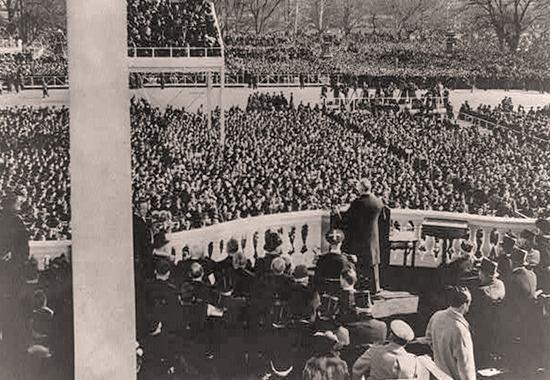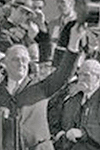|

FRANKLIN DELANO ROOSEVELT - THE
THIRD TERM - 1941
The Ballot or the Bullet
Go here for more about
 Franklin D. Roosevelt.
Franklin D. Roosevelt.
Go here for more about
 Franklin D. Roosevelt's Third
Inaugural Address.
Franklin D. Roosevelt's Third
Inaugural Address.
It follows the full text transcript of
Franklin D. Roosevelt's Third Inaugural address,
delivered on the east portico of the U.S. Capitol, Washington D.C. -
January 20, 1941.

 |
On each national
day of inauguration since 1789, the people have
renewed their sense of dedication to the United
States. |
In Washington's
day the task of the people was to create and
weld together a nation.
In Lincoln's day the task of the people was to
preserve that Nation from disruption from
within.
In this day the task of the people is to save
that Nation and its institutions from disruption
from without.
To us there has come a time, in the midst of
swift happenings, to pause for a moment and take
stock to recall what our place in history has
been, and to rediscover what we are and what we
may be. If we do not, we risk the real peril of
inaction.
Lives of nations are determined not by the count
of years, but by the lifetime of the human
spirit. The life of a man is three-score years
and ten: a little more, a little less. The life
of a nation is the fullness of the measure of
its will to live.
There are men who doubt this. There are men who
believe that democracy, as a form of Government
and a frame of life, is limited or measured by a
kind of mystical and artificial fate that, for
some unexplained reason, tyranny and slavery
have become the surging wave of the future-and
that freedom is an ebbing tide.
But we Americans know that this is not true.
Eight years ago, when the life of this Republic
seemed frozen by a fatalistic terror, we proved
that this is not true. We were in the midst of
shock-but we acted. We acted quickly, boldly,
decisively.
These later years have been living
years-fruitful years for the people of this
democracy. For they have brought to us greater
security and, I hope, a better understanding
that life's ideals are to be measured in other
than material things.
Most vital to our present and our future is this
experience of a democracy which successfully
survived crisis at home; put away many evil
things; built new structures on enduring lines;
and, through it all, maintained the fact of its
democracy.
For action has been taken within the three-way
framework of the Constitution of the United
States. The coordinate branches of the
Government continue freely to function. The Bill
of Rights remains inviolate. The freedom of
elections is wholly maintained. Prophets of the
downfall of American democracy have seen their
dire predictions come to naught.
Democracy is not dying.
We know it because we have seen it revive-and
grow.
We know it cannot die-because it is built on the
unhampered initiative of individual men and
women joined together in a common enterprise-an
enterprise undertaken and carried through by the
free expression of a free majority.
We know it because democracy alone, of all forms
of government, enlists the full force of men's
enlightened will.
We know it because democracy alone has
constructed an unlimited civilization capable of
infinite progress in the improvement of human
life.
We know it because, if we look below the
surface, we sense it still spreading on every
continent-for it is the most humane, the most
advanced, and in the end the most unconquerable
of all forms of human society.
A nation, like a person, has a body-a body that
must be fed and clothed and housed, invigorated
and rested, in a manner that measures up to the
objectives of our time.
A nation, like a person, has a mind-a mind that
must be kept informed and alert, that must know
itself, that understands the hopes and the needs
of its neighbors-all the other nations that live
within the narrowing circle of the world.
And a nation, like a person, has something
deeper, something more permanent, something
larger than the sum of all its parts. It is that
something which matters most to its future-which
calls forth the most sacred guarding of its
present.
It is a thing for which we find it
difficult-even impossible-to hit upon a single,
simple word.
And yet we all understand what it is-the
spirit-the faith of America. It is the product
of centuries. It was born in the multitudes of
those who came from many lands-some of high
degree, but mostly plain people, who sought
here, early and late, to find freedom more
freely.
The democratic aspiration is no mere recent
phase in human history. It is human history. It
permeated the ancient life of early peoples. It
blazed anew in the middle ages. It was written
in Magna Charta.
In the Americas its impact has been
irresistible. America has been the New World in
all tongues, to all peoples, not because this
continent was a new-found land, but because all
those who came here believed they could create
upon this continent a new life-a life that
should be new in freedom.
Its vitality was written into our own Mayflower
Compact, into the Declaration of Independence,
into the Constitution of the United States, into
the Gettysburg Address.
Those who first came here to carry out the
longings of their spirit, and the millions who
followed, and the stock that sprang from
them-all have moved forward constantly and
consistently toward an ideal which in itself has
gained stature and clarity with each generation.
The hopes of the Republic cannot forever
tolerate either undeserved poverty or
self-serving wealth.
We know that we still have far to go; that we
must more greatly build the security and the
opportunity and the knowledge of every citizen,
in the measure justified by the resources and
the capacity of the land.
But it is not enough to achieve these purposes
alone. It is not enough to clothe and feed the
body of this Nation, and instruct and inform its
mind. For there is also the spirit. And of the
three, the greatest is the spirit.
Without the body and the mind, as all men know,
the Nation could not live.
But if the spirit of America were killed, even
though the Nation's body and mind, constricted
in an alien world, lived on, the America we know
would have perished.
That spirit-that faith-speaks to us in our daily
lives in ways often unnoticed, because they seem
so obvious. It speaks to us here in the Capital
of the Nation. It speaks to us through the
processes of governing in the sovereignties of
48 States. It speaks to us in our counties, in
our cities, in our towns, and in our villages.
It speaks to us from the other nations of the
hemisphere, and from those across the seas-the
enslaved, as well as the free. Sometimes we fail
to hear or heed these voices of freedom because
to us the privilege of our freedom is such an
old, old story.
The destiny of America was proclaimed in words
of prophecy spoken by our first President in his
first inaugural in 1789. Words almost directed,
it would seem, to this year of 1941:
"The preservation
of the sacred fire of liberty and the destiny of
the republican model of government are justly
considered . . . deeply, . . . finally, staked
on the experiment entrusted to the hands of the
American people."
If we lose that sacred fire-if we let it be
smothered with doubt and fear-then we shall
reject the destiny which Washington strove so
valiantly and so triumphantly to establish. The
preservation of the spirit and faith of the
Nation does, and will, furnish the highest
justification for every sacrifice that we may
make in the cause of national defense.
In the face of great perils never before
encountered, our strong purpose is to protect
and to perpetuate the integrity of democracy.
For this we muster the spirit of America, and
the faith of America.
We do not retreat. We are not content to stand
still. As Americans, we go forward, in the
service of our country, by the will of God.

More History
|
|